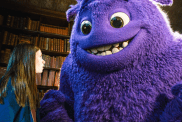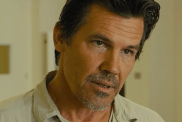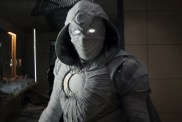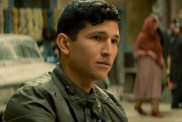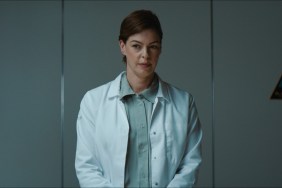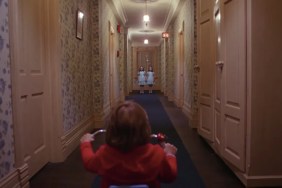
I don’t like Stephen King. Not personally as I have never met him, but his writing, or more to the point, his endings. He is a writer who creates rich characters and tense build-ups, but in the end the build-up is so great that his by-the-numbers endings just don’t hold up.
Recently, my girlfriend asked me to watch The Shining, one of her favorites. I know being a horror guy and a film guy in general, it’s unthinkable that I have never seen this film. But like I stated, I don’t like Stephen King, nor am I the biggest Jack Nicholson fan and, to be frank, there just isn’t enough of Shelley Duvall in some places and a little too much in others to get me excited. So, those are my excuses. After we finished I was intrigued, so we watched The Shining mini-series.
They are near unrecognizable as coming from the same source for most of the duration.
Stanley Kubrick was a master of film and one who makes his own choices. I don’t want to go into the novel, because we are just discussing the movie, but the differences are many.
I, for one, believe that the entire family slips into madness, Jack further than the others. This would make Dick Hallorrann the only one with a reliable point of view. You’ll have to decide for yourself, but I’ll explain my side…
The Shining starts somber with aerial shots of the most secluded mountain roads ever, as we see this little VW Bug trekking upward and onward to the Overlook Hotel. Jack Torrance (Jack Nicholson), a struggling writer, has seen hard times. He is an artist at heart, but has been working as a teacher to support himself and his family. He is now taking a job as a caretaker for the hotel during the winter months when it’s closed. He sees it as an opportunity to be paid as he writes, so that he can finally start the next chapter of his life. The hotel manager, Stuart Ullman, informs him of the hotel’s history including a previous caretaker who murdered his twin girls and wife with an axe before swallowing the business end of a double barreled shotgun. Jack seems concerned but determined to take this job.

Okay, so all the players are in place. We know their history. Now, let’s continue. Danny starts seeing things right away including the dead twins from the previous murder. During the tour, Wendy and Danny are handed over to Dick Hallorann (Scatman Crothers), the head chef, who gives them the kitchen tour.
He starts calling Danny by the name Doc, very casually, which prompts Wendy to ask about it. Apparently, that’s Jack and Wendy’s nickname for him, but Mr. Hallorann wouldn’t know that, or would he? The answer soon comes when, as he’s talking to Wendy, he turns to Danny and speaks to him telepathically. When they are alone, having ice cream, Mr. Hallorann tells Danny about “the shining”, the ability to speak to others telepathically, in which Danny replies that he cannot talk about his ability, because “Tony” won’t let him.
Danny is a frightened child. He possesses a power that he doesn’t understand and it frightens him. More importantly though, is that Danny is a child and does not have the psyche to deal with what he is experiencing. His father dislocated his shoulder in a fit of rage. His parents act less than loving toward each other, and his father is someone that he doesn’t recognize. Adults go mad every day because of the stresses of life. What do you think is going to happen to a child?
As soon as they are alone in the hotel, things start to unravel. Jack’s mind starts to slip, slowly at first, but rapidly as the months go on. Consider this: Jack is a recovering alcoholic. He is a fragile man who has not had a drink in five months due to the incident with his son. In this version he doesn’t go to AA so he basically quit cold turkey. He is alone in an isolated hotel with no one around but the people you love and to some degree, probably resent. You go through stages when you give up something you love, no matter the reasons. Denial, guilt, anger, resentment, all of them, and he’s living with the constant reminder without any other contact what’s so ever. Once Jack cracks outright he begins to see and speak to Mr. Grady. Who steers him toward murder or redrum if you will. He knows the story of Grady and how he murdered his family. He is a writer, so he has an active imagination and is walking the halls that are so quiet that you can hear a pin drop. Thinking about the murders, projected onto his family, irritated that he not only won’t drink, but couldn’t have one if he wanted to, and if that damn kid wouldn’t have gotten hurt in the first place, he would have been able to bring his booze with him…etc.

Whatever the reason, she may have been dragged down mentally by the onslaught of events and the isolation as well.
In the end it could be that only Hallorann is sane. Having dealt with his shining and the hotel for many years he knows how to handle the situation he is in. The child might never recover. Wendy could end up the crazy woman with the cats who lives with her slightly invalid son. It is entirely possible in the world created by Kubrick.
The performances are stellar. Jack Nicholson, who had already become known as a madman, was cast against Stephen King’s wishes, who felt that the character’s decent into madness would be destroyed by his casting. Jack is a sinister person, always has been, always will be. We know he’s mad the second we meet him. There is no shock or surprise. Therefore, it’s not the story, but the storytelling. Stephen King wanted someone more normal and suggested John Voight.
I understand the “everyday man” angle, but they have to be able to bring the insanity. Most actors can do one or the other. Err on the side of caution.
Shelley Duvall, as stated above, plays the film as a fragile victim and almost prisoner of her husband’s will. She doesn’t evoke strength or courage – simply frantic anxiety. Her casting was also disputed by King, who wanted a blonder, sexier, cheerleader type woman that had never dealt with any problems, rather than Duvall, who looked as if she had been run through the ringer. Interestingly, she is the only one we ever see doing any work. She is shown the kitchen, she handles the boilers, etc. She is more caretaker than Jack, who really just sits in front of his typewriter all day. Is she in fact, the caretaker? Since Jack and Danny have the same visions, does Jack exist at all? They both can be seen talking to entities at great length in mirrors. In a deleted scene we learn that Jack’s body is never found. This is a little more far-fetched but again, when you are dealing with a film like this, all bets are off.
All of these are the choices of the director known for getting exactly what he wanted, when he wanted it, no matter how long it took. The hotel set is sparse and claustrophobic at the same time. There is something inherently creepy about long, empty hotel corridors. The music is as haunting as the sets. The opening theme, a variation of Dies Irae, the catholic funeral dirge, echoes the coming of death. A lot of the visions in the film are unexplained. They exist more for cause and effect rather than actual plot points. The meaning of the “blood flood” from the elevator is thematic more than anything as is the final photo on the wall. Stripping away the explanation allows for the viewer to dig deeper into the hotel to find their own answers.

I love this film because sometimes the meat of the story is all you need. The less-is-more philosophy. I’m not one for people who say they’ve “retained the essence” of a book or film, but in Stanley’s case, I make an exception. The film leaves you with many points that cause us to ask: Are there ghosts? Are both Jack and Wendy’s visions a result of their decent into madness? Are Danny’s visions’ in fact premonitions? The possibilities are endless. Kubrick paints an open ended picture that can be interpreted in many different ways and contains some of the most iconic lines and images of modern horror.
Stephen King wrote the teleplay for the 1997 mini-series directed by Mick Garris. It is a faithful adaption of the novel, but as is usually the case, this isn’t always a good thing.
The mini-series begins with Jack being shown the boilers by Pete Watson (Pat Hingle), who tells him about the unstable boilers and the history of the hotel including the suicide of the previous caretaker Grady. As for Ullman, the hotel manager, he doesn’t want Jack there, but the higher ups have already hired him. Jack is a recovering alcoholic complete with bible and “One day at a time“ desk plaque. He lost his teaching job at a prep school for assaulting some asshole kid who was slashing his tires with a large knife. A smarter man would have cried self-defense and assault with a deadly weapon, but Jack is not the sharpest tool in the shed.

The family dynamic is more melodrama than deterioration. The casting is interesting. The adults are all top-notch performers and it did show promise. What works on paper however, doesn’t always work as a piece of action.
Steven Weber’s Jack is nowhere as edgy or as desperate as Jack Nicholson’s performance. He is the everyman that Stephen wanted but is wholly uninteresting. I don’t believe this is the fault of Weber’s, he is a capable and likeable actor – the material just isn’t there. Steven’s Jack is a weak man who succumbed to alcohol and never really rises above that. (This story is personal to King because of his own battle with alcoholism but frankly, who cares?) Also, as executive producer, King was sure to be hands-on and a filmmaker can usually be a writer but a writer is not always a filmmaker. They are two separate sensibilities that don’t always go hand-in-hand.
Tony’s manifestation as a teenager is hokey and turns my stomach around. It just doesn’t work. It plays like a bad superhero adaption. As for Danny (Courtland Mead), he belongs more in a “Dennis the Menace” movie (check out his wardrobe), than this. Where Danny Lloyd was only asked to be scarred and play with his finger, Courtland Mead is asked to carry an extremely psychological role and he can’t carry it.
Rebecca De Mornay is crazy hot as always but, of cours,e doesn’t get naked cause it’s television… Okay, okay…I digress, her character seems as though lifted from a Lifetime movie. She most definitely plays the mother role with strength and conviction, but again, is let down by the script. She is the type of woman King wanted, but as she is played, a problem arises. Rebecca’s Wendy is way too strong for Jack. She never would put up with his bullshit. She demonstrates this throughout the film and it doesn’t ring true in scenes with Steven Weber. We’re left with a feeling that she could clock him at any minute.
Finally, it comes down to Hallorann vs. Hallorann. Scatman Crothers was a veteran of over 100 films in his career. He worked with the best and it showed. Melvin Van Peebles has made 30 some odd films and though a fine actor in his own right, he’s no Scatman. Wardrobe didn’t help either. They dressed him looking like a pimp from one of his exploitation films and that wasn’t a good start. Scatman looked world-weary and wise.

Another major problem with the mini-series is the set. Shot at the real inspiration for the Overlook Hotel, the Stanley Hotel, the Colonial-style structure is more Mark Twain than House on Haunted Hill. The sets undercut the atmosphere and the actor’s performances. The music is equally forgettable, and unfortunately, so are most of the horror scenes. The bathtub lady plays scary and disturbing in the Kubrick film. A twisted scene that leaves you repulsed. As it plays here, it is more of a creepy zombie scene and is also the only genuine creepy moment in the film. Every other scene in the mini-series plays more like a bad remake of the Amityville Horror, down to the stormy final night and crazy father trying to kill his family. There is no tension, no horror. Just the occasional ghost talking to Jack and a message about the evil’s of alcohol. Dialogue. I would talk about it but there isn’t much to say. Every great line from that associated with The Shining came from the Kubrick film, not the book. There’s nothing in the mini-series worth repeating.
Is it hurt by the television format? Yes, I think it is. Too many scenes really don’t mean anything and only get in the way of the film’s dramatic ending. With a miniseries you have the luxury of time, but that can also be your enemy. It runs long and is self-indulgent when it shouldn’t be. Without the theatrical budget, scenes like the hedge animals come off as amateurish and silly. The mafia massacre storyline is less creepy and thought-provoking than the Grady murder/suicide from the film. The New Year’s Eve ball is another area that just doesn’t work. More Dark Castle than Stephen King (and, yes, I know that Dark Castle films came after). Another thing is that the mini-series doesn’t really isolate the family until the end, and even then they don’t ever really feel cut off.
In Kubrick’s film, Jack is locked in the freezer by Wendy and is possibly let out by the ghost of Grady. He then murders Dick Hallorann and chases Danny through a hedge maze before freezing to death in the snow. Garris’ film has Jack chasing his family through the hotel after escaping the freezer and bashing Wendy pretty damn good with the croquet mallet. She returns the favor and hobbles away. Now, the spirits are manifesting themselves to Wendy as Jack limps after her.

So, that leaves us stuck between two Kings. Which adaption is better? I think it’s safe to say that Kubrick’s is better by FAR, but Garris’ is more faithful. Several problems arise from the original material as conceived in King’s head. It may work as a book, but as a film it is mostly potatoes with very little meat. I am glad that I finally saw The Shining and also that I watched the mini-series though that was mostly a day I’ll never get back. So, in the end I still don’t like Stephen King, but I like his ideas, I just think they need to be stripped down like a piece of coal and maybe, just maybe, if you let yourself, you’ll find a diamond.
